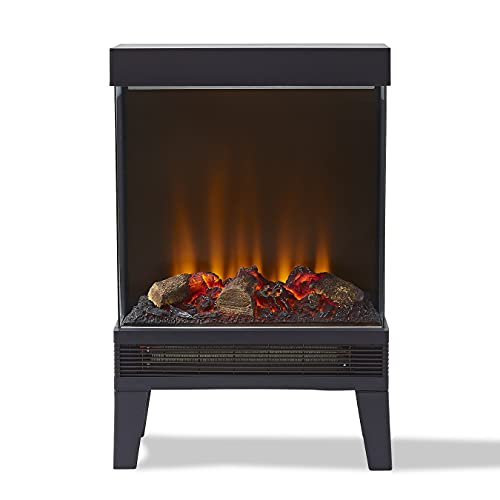The Three Greatest Moments In Bioethanol Fireplace History
페이지 정보

본문
 The Benefits of an Ethanol Fireplace
The Benefits of an Ethanol FireplaceEthanol fireplaces are an excellent alternative to gas or wood fires as they don't require a chimney or flue. They also don't generate any smoke or ash and can be easily moved from one home to another.
Use bio-ethanol only on burners designed to burn the fuel. The warranty on your burner may be voided when you use other liquid fuels or gels.
Cost
The price of a fireplace made out of bioethanol differs based on the design and style you select. There are models that range from a few hundred to a few thousands dollars, however they're typically cheaper than a wood or gas fireplace. Some are designed to be freestanding fireplace while others can be recessed into the wall or attached to the chimney. Ethanol fires are also more ecologically friendly than their wood-burning counterparts.
Bio ethanol fires are very popular due to their natural, beautiful flame that is free of any smoke or soot. They can be used virtually anywhere and are easy to maintain. However it is important to only use bio ethanol fuel that is specifically made for use in these fireplaces. Other types can damage the burner, which increases the danger of fire. In addition, you should not keep flammable items near the bioethanol fire.
 Ethanol fireplaces are great for heating rooms, but they should not be used as your primary source of heat. They are much more efficient than wood-burning stoves, and they are able to generate a decent amount of heat, around 2kW in average. This is not enough to heat a whole home, but it will certainly assist in warming a small room.
Ethanol fireplaces are great for heating rooms, but they should not be used as your primary source of heat. They are much more efficient than wood-burning stoves, and they are able to generate a decent amount of heat, around 2kW in average. This is not enough to heat a whole home, but it will certainly assist in warming a small room.You will also need to take into account the costs of maintaining an ethanol fireplace. The fireplace should be stored in a secure location and out of reach of children and pets. Always follow the manufacturer's guidelines for adding fuel, putting the flame out and allowing the fire to cool.
A ethanol fireplace is a great alternative to traditional wood-burning stoves or an electric firesuite fire. This type of fire has the principal benefit that it doesn't need the chimney. You can save money by not having to install and maintain a chimney. It is also safer than other fireplaces. It is still a good to speak with a professional before making a final decision. You can be certain that the fireplace is installed correctly and safely.
Environmental impact
An ethanol fireplace can be an eco-friendly alternative to traditional wood-burning fires. Bioethanol fuel is made from plant waste such as straw, corn, and maize. The biofuel's liquid is further distilled to allow it to burn efficiently and effectively. This kind of fuel is a renewable source of energy and doesn't emit harmful smells or emissions. It's also free of soot and smoke. This makes it a safer choice for your home.
Ethanol fireplaces don't require venting and chimneys They can be put in almost any room in your house. The majority of models come with a remote control. A lot of them have a built-in cooling system that prevents the fuel from overheating. They can be used as a primary source of heating or an additional heating unit. They are also ideal for people who live apartments or condos.
Bio ethanol fireplaces produce very low levels of odours, which makes them a perfect choice for homes that have people who suffer from allergies or asthma. In fact, this kind of fireplace is able to be installed in a nursery for babies or in a child's bedroom. The fireplaces should be kept away from items that can ignite, like curtains or furniture.
One of the biggest benefits of an ethanol fireplace is its simple use. It is easier to install than a wood-burning fireplace and does not require complicated electrical connections or installations. Moreover, the liquid fuel can be stored in a portable tank, so that it can be easily moved from room to room. This allows you to take pleasure in the warmth of a fireplace without having to deal with the mess of chopping, stacking and cleaning wood.
A bioethanol fireplace produces a minimal amount of pollution. This makes it an ideal choice for those who are concerned about the environment. Additionally the fireplaces are a great way to save energy and money.
Safety
A bioethanol fireplace is a safe alternative to an open flame. They are easy to operate, create less smoke and burn more efficiently than other alternatives. However, as with all fireplaces and other fire-producing appliances, they can be dangerous if used incorrectly. These fireplaces need special care, so make sure you read and follow the instructions.
If you're using a bioethanol fireplace stove ensure that you put it in a room that is well ventilated and away from other fire-prone materials. Keep pets and children away from the fire. Do not move it while the fire is still burning. This could trigger an explosion.
Bioethanol fireplaces aren't as dangerous as gas or wood fireplaces, however there are safety guidelines that must be followed in order to ensure safe operation. Keep any flammable items at least 1500mm away from the burner and don't touch it while the flame is burning. It is also important to never refill a fire with non-approved fuel.
The process of burning bio-ethanol fire places is safe, especially when you follow the guidelines. In essence, the fuel is then pumped into a vapour accelerator, where it vaporizes, and then ignited by a filament. This method of combustion ensures that the fuel is completely combustion-free, which means it is free of smell and harmful substances like dioxins and furans.
Ethanol fireplaces can be hazardous when not properly used and it is essential to follow the instructions of the manufacturer when installing and operating them. They should be kept away from combustible material, such as curtains and newspapers. They should be kept at a away from other appliances in the household and should not be placed in close proximity to sleeping animals or children.
The primary benefit of a bioethanol fireplace is that it doesn't release any odour or harmful fumes making it an extremely safe option for families with pets or children. They are also more convenient to utilize than traditional fireplaces since they don't require a chimney, and do no cause carbon monoxide poisoning. These fireplaces provide a number of benefits, including the ability to install them wherever you want and move them around.
Installation
A bioethanol fireplace is a great option to add ambience and warmth to your home. They come in various designs and can be set up in a number of ways. They can be built-in, wall-mounted, freestanding fireplace, or see-through. You should always read the installation manual for a fireplace prior installing it. This will allow you to avoid any issues during installation and ensure that your fireplace is safe to use.
Installing a bioethanol fire is fairly simple. It involves putting in the burner and constructing an enclosure to be inserted into the wall. The frame should be constructed of a material that is not flame-proof. This will stop the flame from burning the wall. It also prevents the flame from spreading to other parts of the room. The frame must be attached to the wall using suitable screws and dowels.
The ethanol fireplace does not require a flue or chimney unlike other types fireplaces. This makes them more cost-effective for homeowners. They can also be put in any space and easily moved. Additionally, they do not produce any harmful emissions.
When properly used When used correctly, bioethanol fireplaces are safe. But as with any fire, it should be kept away from any surfaces that could ignite and children. In addition, the fuel must be kept in a secure location and the fire smothered prior to fueling it again.
Ethanol fireplaces do not produce any ash or soot, and they are easy to clean. They are a great option for those who are concerned about the effect on the environment that traditional wood-burning ones. Ethanol fireplaces are an excellent alternative to gas or electric fireplace fireplaces.
Although bioethanol fireplaces can be a wonderful addition to any home however, they shouldn't be used as a primary source of heat. They are designed to add warmth and create a cozy ambiance however, they aren't powerful enough to heat an entire home. Engaging an expert to install your bioethanol fireplace is the most efficient method to go.
- 이전글What's The Current Job Market For Mines Game Online Professionals Like? 24.12.31
- 다음글Asbestos Lawsuits Tools To Improve Your Everyday Lifethe Only Asbestos Lawsuits Technique Every Person Needs To Be Able To 24.12.31
댓글목록
등록된 댓글이 없습니다.
